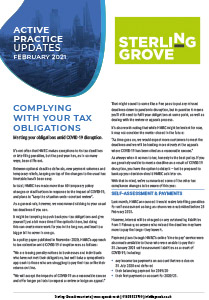Resource Hub
Complying with your Tax Obligations
Meeting your obligations amid COVID-19 disruption.
It’s not often that HMRC makes exceptions to its tax deadlines or late-filing penalties, but the past year has, as in so many ways, been different.
Between optional deadline deferrals, new payment schemes and temporary reliefs, keeping on top of the changes to the usual tax timetable hasn’t been easy.
In total, HMRC has made more than 60 temporary policy changes or clarifications in response to the impact of COVID-19, and plans to “keep the situation under constant review”.
As a general rule, however, we recommend sticking to your usual tax deadlines if you can.
It might be tempting to push back your tax obligations and give yourself just a bit more time if the option’s there, but doing this can create more work for you in the long run, and lead to a bigger bill to cover in one go.
In a policy paper published in November 2020, HMRC’s approach to tax collection amid COVID-19 disruption was as follows:
“We are issuing penalty notices to businesses and individuals who have not met their obligations, but we’ll take a sympathetic approach to those who are struggling to pay their tax or file their returns on time.
“We will accept the impacts of COVID-19 as a reasonable excuse and offer longer periods to request a review or lodge an appeal.”
That might sound to some like a free pass to put any missed deadlines down to pandemic disruption, but in practice it means you’ll still need to fulfil your obligations at some point, as well as dealing with the review or appeals process.
It’s also worth noting that while HMRC might be lenient for now, it may not consider the matter closed in the future:
“As time goes on, we would expect more customers to meet the deadlines and we will be looking more closely at the appeals where COVID-19 has been cited as a reasonable excuse.”
As always when it comes to tax, honesty is the best policy. If you are genuinely unable to meet a deadline as a result of COVID-19 disruption, you have the option to delay it – but be prepared to back up your decision should HMRC ask later on.
With that in mind, we’ve summarised some of the other tax compliance changes to be aware of this year.
SELF-ASSESSMENT & PAYMENTS
Last month, HMRC announced it would waive late-filing penalties for self-assessment as long as returns were submitted before 28 February 2021.
However, interest will be charged on any outstanding liabilities from 1 February, so anyone who missed the deadline may have more to pay the longer they leave it.
Payment plans through HMRC’s online ‘time-to-pay’ service were also made available to those who were unable to pay their 31 January 2021 self-assessment liabilities as a result of COVID-19, including:
• any income tax payments on account that were due on 31 July 2020 and deferred
• their balancing payment for 2019/20
• their first payment on account for 2020/21.
The plans, which allow taxpayers to spread the cost of their tax bill over 12 monthly instalments, can be used to repay debt of no more than £30,000. HMRC said almost 25,000 people opted to pay their tax liabilities this way before last month’s selfassessment deadline for 2019/20.
They cannot be started by people with outstanding tax returns, other tax debts, or other HMRC payment plans, however, and interest is now charged on the outstanding balance.
VAT
In response to the disruption caused by the first wave of the pandemic, VAT-registered businesses could delay any VAT payments due between 20 March and 30 June 2020, including advance payments under the annual accounting scheme.
HMRC said businesses deferred a total of £28.2 billion of VAT payments through this scheme for return liability periods that ended in February, March and April 2020.
Businesses were not required to notify HMRC to opt in – they simply had to cancel their direct debit – but the deferred amounts should be paid on or before 31 March 2021.
Alternatively, businesses can spread this liability under a new payment scheme, which allows deferred VAT to be paid in up to 11 instalments with no extra interest due.
To use this scheme, you need to have submitted all of your outstanding VAT returns for the last four years, have corrected any errors, and know exactly how much you owe.
You can opt in using your Government Gateway account. This has to be done by the taxpayer, so we can’t opt in on your behalf, but we can help you to understand the scheme.
CORPORATION TAX & COMPANY ACCOUNT
The accounts filing deadline for private companies that were due to file accounts any time between 27 June 2020 and 5 April 2021 has been extended from nine to 12 months.
This extension could have a knock-on effect for corporation tax liability payments, which remain due nine months and one day after the end of the accounting period.
Companies that are having difficulty getting their year-end corporation tax return filed on time can contact HMRC ahead of the deadline to request a deferral of the late-filing penalty, again citing COVID-19 disruption as a “reasonable excuse”.
HMRC has also updated its guidance on corporation tax payments, acknowledging the difficult circumstances many businesses are facing due to COVID-19. In “exceptional circumstances”, HMRC will now consider the following:
- repaying companies’ corporation tax payments for prior periods, before the end of their current accounting period based on anticipated losses.
- repaying quarterly instalments in respect of the prior period before the end of their current accounting period based on anticipated losses.
Companies will be expected to provide HMRC with full evidence to support their claims, however.
OTHER TAXES
Taxpayers can contact HMRC to ask for extra time to repay any other liabilities, but will need to be able to justify the deferral.
For appeals against any tax decision or penalty from 1 February 2020 that are delayed because of COVID-19, an extra three months has also been added to the usual 30-day window.
Barring any last-minute U-turns, there are also some areas of tax compliance where businesses will face new obligations this year, including the domestic VAT reverse charge for construction services from 1 March 2021 and the extension of IR35 to the private sector from 6 April 2021.
THE FUTURE OF TAX COMPLIANCE
According to HMRC, COVID-19 has reaffirmed the need for the tax system to be “more adaptable, resilient and responsive”.
In July 2020, HMRC and the Treasury published a 10-year plan to achieve their vision of a modern tax system, based on real-time tax information and connectivity with third-party services.
Its aims extend beyond getting tax online, encouraging businesses to engage with digital systems more generally – something we’ve all had to do during the pandemic.
One part of this strategy is Making Tax Digital, which will see more people keeping their digital tax records and filing online.
This is already required for businesses that are over the VAT-registration threshold, and is now set to extend to all VAT-registered firms from 2022, income tax self-assessment from 2023, and corporation tax from 2026 or later.
Other parts of the strategy include “exploring appropriate timing and frequency for the payment of different taxes”, and “a reform of the tax administration framework itself”.
HMRC also said where it has introduced temporary arrangements that have “improved the customer experience or created operational improvements”, it will “try to build on these changes to deliver long-term sustainable solutions”.
Contact us today to discuss how we can help you put together a road map that will keep your business on course for growth and success.

